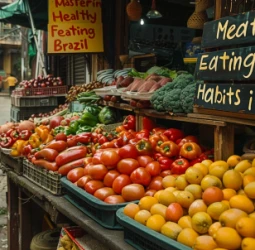As we age, our nutritional needs change, and it becomes increasingly important to pay attention to our diet in order to maintain good health in our later years. Brazil, like many other countries, is facing a growing population of elderly citizens. With this demographic shift, there is a need for increased awareness and focus on proper nutrition for the elderly.
One of the main challenges for elderly nutrition in Brazil is the lack of access to healthy and diverse food options. This is especially true for those who live in rural areas or who have limited mobility. As a result, many elderly people in Brazil are at risk of malnutrition, which can lead to a variety of health issues such as weakened immune systems, increased risk of falls and fractures, and cognitive decline.
In addition to the lack of access, there are also specific nutrient needs that are important for the elderly population. As we age, our bodies become less efficient at absorbing certain nutrients, such as vitamin B12 and calcium. This can lead to deficiencies and contribute to age-related health problems. It is therefore crucial for elderly individuals to ensure they are getting enough of these essential vitamins and minerals in their diet.
A well-balanced diet is key for elderly nutrition. This means including a variety of foods from different food groups, such as fruits, vegetables, whole grains, lean proteins, and healthy fats. Eating a variety of foods not only provides a range of nutrients but also helps to prevent monotony in the diet, which can be a common issue for elderly individuals who may have a limited appetite.
In addition to a balanced diet, it is also important for the elderly to stay hydrated. Dehydration can happen easily in older adults and can lead to a variety of health problems, including confusion, constipation, and urinary tract infections. Encouraging water intake throughout the day or incorporating hydrating foods such as fruits and vegetables can help prevent dehydration.
Another important aspect of elderly nutrition is considering any specific health conditions or medications that an individual may have. For example, those with diabetes may need to monitor their carbohydrate intake, while those on blood thinners may need to limit their intake of vitamin K-rich foods. It is important for elderly individuals to consult with their healthcare provider to determine any specific dietary needs or restrictions.
Social support also plays a crucial role in elderly nutrition. Often, as people age, they may become more isolated, leading to a decrease in the enjoyment of meals and potential weight loss. Creating a social atmosphere around mealtime can help to increase appetite and improve overall well-being. This can include sharing meals with friends and family, joining community meal programs, or volunteering at a local food bank.
In Brazil, there are several initiatives and programs aimed at addressing the issue of elderly nutrition. The government has implemented programs to provide food and nutritional support to those in need, particularly to those living in rural areas. Additionally, there are non-profit organizations and community centers that offer meal services and nutrition education for the elderly.
In conclusion, proper nutrition is crucial for maintaining good health in our later years. In Brazil, where there is a growing population of elderly individuals, it is essential to address the challenges and barriers to elderly nutrition. By promoting a healthy and balanced diet, staying hydrated, and considering individual needs, we can ensure that our elderly citizens in Brazil can lead healthy and fulfilling lives.
One of the main challenges for elderly nutrition in Brazil is the lack of access to healthy and diverse food options. This is especially true for those who live in rural areas or who have limited mobility. As a result, many elderly people in Brazil are at risk of malnutrition, which can lead to a variety of health issues such as weakened immune systems, increased risk of falls and fractures, and cognitive decline.
In addition to the lack of access, there are also specific nutrient needs that are important for the elderly population. As we age, our bodies become less efficient at absorbing certain nutrients, such as vitamin B12 and calcium. This can lead to deficiencies and contribute to age-related health problems. It is therefore crucial for elderly individuals to ensure they are getting enough of these essential vitamins and minerals in their diet.
A well-balanced diet is key for elderly nutrition. This means including a variety of foods from different food groups, such as fruits, vegetables, whole grains, lean proteins, and healthy fats. Eating a variety of foods not only provides a range of nutrients but also helps to prevent monotony in the diet, which can be a common issue for elderly individuals who may have a limited appetite.
In addition to a balanced diet, it is also important for the elderly to stay hydrated. Dehydration can happen easily in older adults and can lead to a variety of health problems, including confusion, constipation, and urinary tract infections. Encouraging water intake throughout the day or incorporating hydrating foods such as fruits and vegetables can help prevent dehydration.
Another important aspect of elderly nutrition is considering any specific health conditions or medications that an individual may have. For example, those with diabetes may need to monitor their carbohydrate intake, while those on blood thinners may need to limit their intake of vitamin K-rich foods. It is important for elderly individuals to consult with their healthcare provider to determine any specific dietary needs or restrictions.
Social support also plays a crucial role in elderly nutrition. Often, as people age, they may become more isolated, leading to a decrease in the enjoyment of meals and potential weight loss. Creating a social atmosphere around mealtime can help to increase appetite and improve overall well-being. This can include sharing meals with friends and family, joining community meal programs, or volunteering at a local food bank.
In Brazil, there are several initiatives and programs aimed at addressing the issue of elderly nutrition. The government has implemented programs to provide food and nutritional support to those in need, particularly to those living in rural areas. Additionally, there are non-profit organizations and community centers that offer meal services and nutrition education for the elderly.
In conclusion, proper nutrition is crucial for maintaining good health in our later years. In Brazil, where there is a growing population of elderly individuals, it is essential to address the challenges and barriers to elderly nutrition. By promoting a healthy and balanced diet, staying hydrated, and considering individual needs, we can ensure that our elderly citizens in Brazil can lead healthy and fulfilling lives.



 admin
admin















